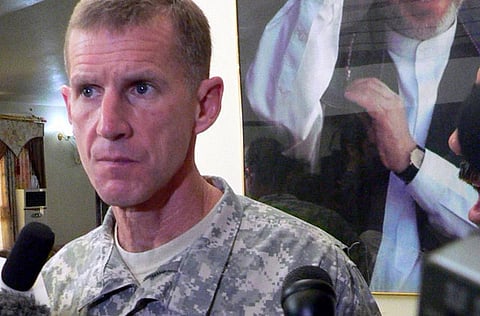McChrystal's exit is a bad sign
Washington needs to rethink its strategy if it is to achieve success in war on terror

The change of US military command in Afghanistan — with the departure of General Stanley McChrystal and his replacement by General David Petraeus says much about the failure of Washington to get its act together in fighting one of the world's toughest battles.
For the moment, the US is trying hard to put on a brave face. The message from Washington is clearly that of ‘business as usual' in the conduct of the Afghan war. But this message is not convincing.
America may be winning some of the more publicised battles in Afghanistan, but these are just the ones that the outside world is aware of. America's ability to win the overall conflict remains in doubt, as the Taliban remain a formidable force to be reckoned with.
The history of the past year is a telling account of the tenacity of Afghanistan's rag-tag fighters, who may have been defeated at times, but are certainly far from being wiped out. On the contrary, not only the US but indeed the world is now compelled to accept the Taliban as a force to be reckoned with, as is seen from growing acceptance that they need to be engaged politically.
This acceptance in itself confirms that America is unable to win a decisive military victory in Afghanistan that will permanently quell the Taliban advance.
Indeed, the Obama administration is showing signs of wanting to withdraw from Afghanistan. In its eyes, the best possible outcome of this conflict is one in which Washington's own security interests can be protected.
The issue, however, is that Washington's domestic security interests cannot be detached from global security interests. Be it the wars in Iraq or Afghanistan or indeed the unresolved conflicts in Palestine or Kashmir, America's footprints are everywhere, and this serves as a major provocation for people directly caught up in such conflicts.
Going forward, there are three overarching lessons that must be learned as the US puts on a bold face following the embarrassing events leading to McChrystal's unceremonial departure.
First, winning the Afghan conflict as with many other campaigns of this nature — is not a purely military objective. To his credit, McChrystal appeared to understand the significance of the battle for hearts and minds. This was evident from the reduction in the number of US aerial attacks, which had previously mistakenly targeted civilians in Afghanistan and brought only disrepute for the world's biggest military power.
Civilian assistance
Additionally, there is a need to widen the war effort rapidly to oversee a successful turnaround in economic and developmental efforts in the war-torn country. For too long, this issue has been neglected. Rather than invest in a turnaround in the daily lives of ordinary people, the US continues to pump the majority of its resources into the war effort. Meanwhile, Afghans feel more neglected by the day, and only have more reason to become increasingly sceptical of Washington's intentions.
Second, the US is badly neglecting its responsibility to build trust with Pakistan, Afghanistan's key neighbour. As Washington becomes increasingly embroiled in controversy and anxiety, Pakistan's role as the long-term stabiliser of the Afghanistan-Pakistan region only becomes more important.
While Washington seeks to overcome its difficulties in Afghanistan, it must also recognise that there is a major challenge in Pakistan that needs to be tackled. Acceptance of an obvious reality is the first step towards addressing a challenge that has been neglected for too long.
The Pakistan factor is a significant one, especially given that Islamabad remains the only regional player that is capable of taking responsibility once the US withdraws from the conflict.
Finally, the US position in Afghanistan cannot be detached from the controversies surrounding Washington elsewhere in the world. Widely seen in many Muslim countries as the ‘big bully', the US must take note of the way its position is weakened by long-standing conflicts such as the one in Palestine.
The US' continued backing for Israel in spite of mounting evidence of Tel Aviv's refusal to accept reasonable terms for a settlement on Palestine only serves to undermine its position. Is it possible for the US to ever be seen as a friend in the Muslim world when its position is already so badly compromised? Surely not.
Farhan Bokhari is a Pakistan-based commentator who writes on political and economic matters.



